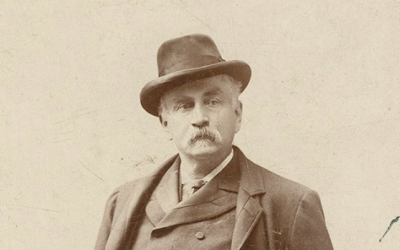William H. Ashby
Relatively few ex-Confederates chose to locate in Nebraska Territory following the close of the Civil War. One who did was William H. Ashby, a lawyer, civil servant, newspaperman, and land speculator, who lived from 1865 to about 1912 in southeast Nebraska.
Ashby was born in Livingston County, Missouri, in 1841 and grew to manhood in Missouri. He began the study of law at the age of eighteen. In 1861 he enlisted in the Confederate Army and served under Gen. Sterling Price. Seriously wounded at Vicksburg, he was promoted to the rank of captain and served to the end of the war.
Ashby was in Nebraska City by August 1865, where he began the practice of law. He moved to Beatrice in 1869, where he resumed his law practice, which was to occupy him intermittently during many years of residence in Nebraska. Ashby also entered the newspaper field. With J. M. Hoggshead he purchased a half interest in the Blue Valley Record and changed its name to the Beatrice Clarion, conducted as an independent publication until its sale in the spring of 1870. Later, in 1879, he was associated with the Beatrice Leader.
Ashby had a varied political career. The Morton-Watkins history of Nebraska noted that “at one time or another [he was] an ardent member of every one of the parties.” Ashby ran for office in Gage County as a Democrat in the early 1870s. In 1876 he attended the Republican state convention, where he was defeated by Thomas Majors for nomination as contingent congressman. In 1879 he attended the Greenback Party state convention, where he was said to be the “chanticleer” of the convention. Ashby was also married in 1879on the Fourth of July-to Zilla Shaw of San Francisco.
Ashby held several appointive offices. In June 1875 President Ulysses S. Grant appointed him a member of the Allison Commission (headed by U.S. Senator William B. Allison), which was to discuss with the Sioux the possible purchase by the government of the Black Hills. Ashby and Congressman Abram Comingo of Missouri, another member of the commission, spent several months preparing for the meeting. But the Sioux were in no mood to sell the Black Hills, and the Allison Commission ended in failure. In January 1877 Ashby was sent by the U.S. government as a special agent to Panama, the West Indies, and South America to investigate irregularities in the importation of sugar.
In 1881 he and Samuel Wymore bought land adjoining the new Gage County town of Wymore and divided the purchase into town lots. After he sold his Wymore property in 1886, he returned to Beatrice and resumed his law practice. He retired to Berkeley, California, about 1912.
(June 2006)



